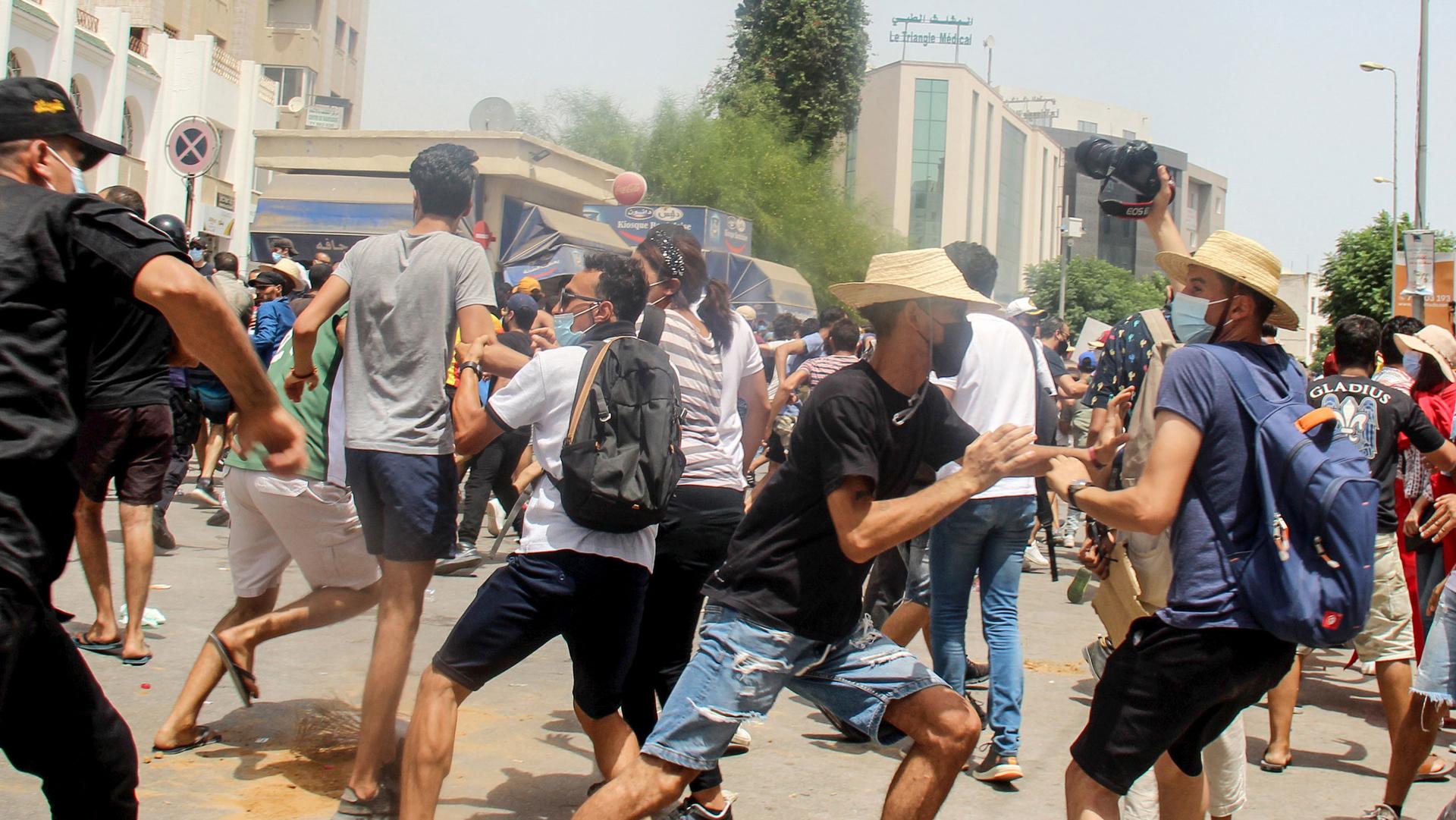Tunisia on edge as president suspends parliament, fires PM
A Tunisian police officer scuffles with protesters during a demonstration in Tunis, Tunisia, July 25, 2021.
The president of Tunisia suspended the legislature and fired the prime minister on Sunday following nationwide protests over the country’s economic troubles and the government’s handling of the coronavirus crisis.
Protesters celebrated President Kais Saied’s decision late Sunday night with shouts of joy, honking of horns and waving Tunisian flags. But his critics accused him of a power grab, and the North African country’s overseas allies expressed concern that its young democracy might be descending again into autocracy. In a move sure to fuel those worries, police raided the offices of broadcaster Al Jazeera and ordered it to shut down.
Tunisia, which ignited the Arab uprisings when protests led to the overthrow of its longtime autocratic leader, is often regarded as the only success story of those uprisings. But democracy did not bring prosperity: Tunisia’s economy was already flailing before the pandemic hit, with 18% unemployment, and young people demanding jobs and an end to police brutality protested in large numbers earlier this year. The government recently announced cuts to food and fuel subsidies as it sought its fourth loan from the International Monetary Fund in a decade, fueling anger in impoverished regions.
The pandemic has only compounded those problems, and the government recently reimposed lockdowns and other virus restrictions in the face of one of Africa’s worst outbreaks.
Angry at the economic malaise and the poor handling of the pandemic, thousands of protesters defied virus restrictions and scorching heat in the capital, Tunis, and other cities Sunday to demand the dissolution of parliament. The largely young crowds shouted “Get out!” and slogans calling for early elections, and also pushed for economic reforms. Clashes erupted in many places.
The president said he had to fire the prime minister and suspend parliament because of concerns over public violence. He said he acted according to the law — but parliament speaker Rached Ghannouchi, who heads the Islamist party that dominates the legislature, said the president didn’t consult with him or the prime minister as required. The three have been in conflict.
“We have taken these decisions … until social peace returns to Tunisia and until we save the state,” Saied said in a solemn televised address. He warned against any breach of public order, threatening severe penalties.
Police intervened Monday to prevent clashes outside the parliament building between lawmakers from the dominant Ennahdha party and demonstrators supporting the president. Both sides shouted and some threw stones, according to an Associated Press reporter and videos circulating online.
Ghannouchi, the speaker, tried to enter parliament overnight but police and military forces guarding the site stopped him. On Monday morning, he was in a car in front of the building — his next steps unclear.
He called the president’s move “a coup against the constitution and the (Arab uprising) revolution,” and insisted the parliament would continue to work.
Tensions between the prime minister and president have been blamed for poor management of the virus, and a bungled vaccination drive led to the sacking of the health minister earlier this month.
To date, 7% of the population has been fully vaccinated, while more than 90% of the country’s ICU beds are occupied, according to health ministry figures. Videos have circulated on social media showing dead bodies left in the middle of wards as morgues struggle to deal with growing deaths.
Ennahdha has been a particular target, accused of focusing on its internal concerns instead of managing the virus.
Security forces also moved in Monday on the Tunis offices of Al Jazeera, according to a statement by the Qatar-based network on its Facebook page. The reason for the move was not immediately clear.
Al-Jazeera, citing its journalists, said 10 “heavily armed police officers” entered their bureau without a warrant and asked everyone to leave. “The reporters’ phones and other equipment were confiscated, and they were not allowed back into the building to retrieve their personal belongs,” the organization said.
Qatar and its Al-Jazeera satellite news network has been viewed by some Mideast nations as promoting Islamist groups like the Muslim Brotherhood. Its offices have been shut down in other countries over that, most noticeably in Egypt after the 2013 coup that brought current President Abdel-Fattah el-Sissi to office.
The president’s move has garnered him support in some quarters, but also sparked concern here and abroad that it represented an authoritarian turn for the nascent democracy.
Saied visited protesters overnight on the capital’s main thoroughfare, Avenue Bourguiba, the epicenter of mass demonstrations that ushered in the Arab Spring.
Former President Moncef Marzouki called for political dialogue, saying in a Facebook video, “We made a huge leap backward tonight, we are back to dictatorship.”
German Foreign Ministry spokesperson Maria Adebahr said the government is “very worried” by the events in Tunisia and is in discussion with Tunisian authorities.
“We think it’s important now to return really quickly to the constitutional order,” Adebahr told reporters in Berlin.
She stopped short of calling it a coup but said that the Tunisian president appeared to be relying on a “pretty broad interpretation of the constitution” to defend the move.
Turkey’s government said it was “deeply concerned” by the suspension of parliament and said it hoped that “democratic legitimacy” is soon restored.
The president invoked an article of Tunisia’s Constitution that allows him to assume executive power and freeze parliament for an unspecified period of time in cases of “imminent danger threatening the institutions of the nation and the independence of the country and hindering the regular functioning of the public powers.”
By Bouazza Ben Bouazza/AP
